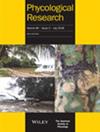Establishing a new genus, Chiharadinium gen. nov. (Peridiniales, Dinophyceae) for a tidal pool dinoflagellate formerly known as Scrippsiella hexapraecingula
IF 1
4区 生物学
Q2 MARINE & FRESHWATER BIOLOGY
引用次数: 0
Abstract
To determine its accurate taxonomic position, a tidal pool bloom‐forming dinoflagellate, Scrippsiella hexapraecingula was re‐investigated using light, scanning and transmission electron microscopy together with a phylogenetic analysis based on concatenated ribosomal DNA sequences. The culture strains used in this study were established from intertidal rock pool samples taken from Jogashima, Kanagawa prefecture and Heisaura, Chiba prefecture, Japan and were identified as S. hexapraecingula originally described by Horiguchi and Chihara from a tidal pool in Hachijo Island, Tokyo, Japan in 1983. The thecal plate arrangement was determined as Po, X, 4′, 3a, 6″, 6c, 5s, 5″′, 2″″. The internal structure was investigated for the first time. The organism has typical dinoflagellate cellular organelles such as a dinokaryotic nucleus, mitochondria with tubular cristae, trichocysts and pusule. The chloroplast was single and connected to the central pyrenoid (stalked type). The eyespot found in the sulcus is of the B type with two rows of superficial intraplastidal lipid globules directly overlain by an extraplastidal single layer of crystalline bricks enveloped by a common membrane. The apical pore is plugged by a double‐layered stub‐like structure. Stalk building material for attachment covered the apical pore. Phylogenetic analysis indicated that S. hexapraecingula was most closely related to a freshwater dinoflagellate, Peridiniopsis borgei, the type species of the genus Peridiniopsis. However, clear differences exist between these two organisms, including their thecal plate arrangement, habitat and habit. As a result, a new genus, Chiharadinium Dawut & T. Horiguchi gen. nov. has been proposed rather than attempting to accommodate S. hexapraecingula in the genus Peridiniopsis. The new combination, Chiharadinium hexapraecingulum (T. Horiguchi & Chihara) Dawut & T. Horiguchi comb. nov. has been proposed.为一种潮汐池鞭毛藻建立了一个新属Chiharadinium gen. 11 (Peridiniales, Dinophyceae),该鞭毛藻以前被称为Scrippsiella hexapraecingula
为了确定其准确的分类位置,使用光学、扫描和透射电子显微镜,以及基于串联核糖体DNA序列的系统发育分析,对一种形成潮池水华的甲藻——六角叉尾藻——进行了重新研究。本研究中使用的培养菌株是从日本神奈川县东岛和千叶县黑浦的潮间带岩石池样本中建立的,并被鉴定为六角锥虫,最初由Horiguchi和Chihara于1983年从日本东京八条岛的潮汐池中描述。鞘板排列确定为Po,X,4′,3a,6〃,6c,5s,5〃′,2〃〃。首次对其内部结构进行了研究。该生物体具有典型的甲藻细胞器,如甲核、带管状嵴的线粒体、毛囊肿和脓疱。叶绿体是单一的,与中心蛋白核相连(茎型)。在脑沟中发现的眼窝是B型的,有两排浅表的可塑内脂质球,上面直接覆盖着一层由普通膜包裹的可塑外单层结晶砖。顶端孔隙被双层的桩状结构堵塞。用于附着的茎状建筑材料覆盖了顶端孔。系统发育分析表明,六角锥藻与一种淡水甲藻Peridiniopsis borgei亲缘关系最为密切,后者是Peridiniopis属的模式种。然而,这两种生物之间存在着明显的差异,包括它们的鞘板排列、栖息地和习性。因此,人们提出了一个新属,Chiharadinium Dawut&T.Horiguchi gen.nov.,而不是试图将S.hexapraecingula归入Peridiniopsis属。新组合,Chiharadinium hexapraecingulum(T.Horiguchi&Chihara)Dawut&T.Horigchi梳。nov.已经提出。
本文章由计算机程序翻译,如有差异,请以英文原文为准。
求助全文
约1分钟内获得全文
求助全文
来源期刊

Phycological Research
生物-海洋与淡水生物学
CiteScore
3.60
自引率
13.30%
发文量
33
审稿时长
>12 weeks
期刊介绍:
Phycological Research is published by the Japanese Society of Phycology and complements the Japanese Journal of Phycology. The Journal publishes international, basic or applied, peer-reviewed research dealing with all aspects of phycology including ecology, taxonomy and phylogeny, evolution, genetics, molecular biology, biochemistry, cell biology, morphology, physiology, new techniques to facilitate the international exchange of results. All articles are peer-reviewed by at least two researchers expert in the filed of the submitted paper. Phycological Research has been credited by the International Association for Plant Taxonomy for the purpose of registration of new non-vascular plant names (including fossils).
 求助内容:
求助内容: 应助结果提醒方式:
应助结果提醒方式:


